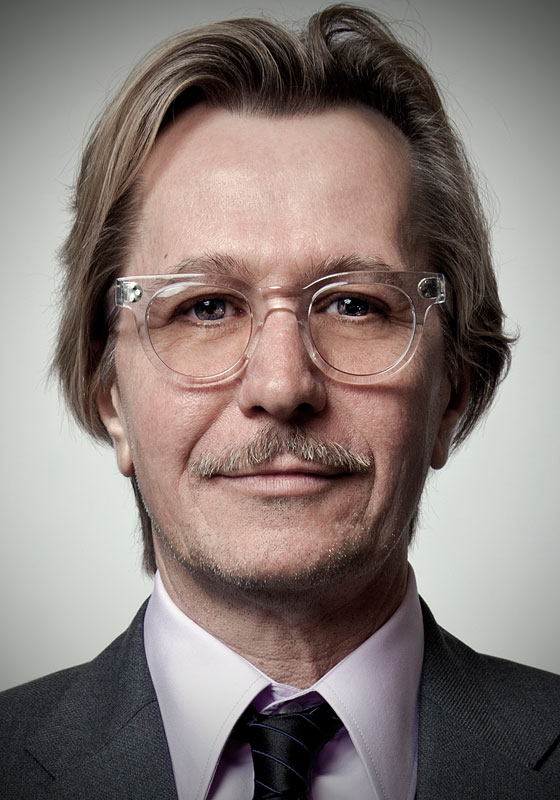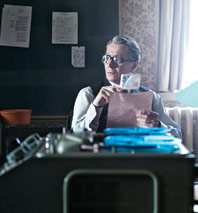
The man sat near the back of the bar, where he would not be noticed. Winter was coming on, and as piano music tinkled through the grand hotel, couples in the lounge drank martinis and Champagne in chairs slung with parkas and leopard furs and dark wool driving coats. The man was more fashionable than the others, with a rakish flip of sandy hair and vintage bifocals and a Paul Smith scarf with little dogs knotted loosely around his neck. He was at a table in the shadows and faced away from the lobby. His code name, the one he gave on checking in to the Waldorf-Astoria this visit, was Andrew Carnegie, chosen on a whim because he’d recently been reading about the great tycoons of the Gilded Age. When the man was younger, before he had gotten more savvy, he would register under his own name, but then the phone in his room would ring and he would pick up, expecting it to be one of maybe three people, only to find “a loony on the line.” Gary Oldman could not be too careful.
He had been thinking a lot, lately, about watching and being watched. Playing George Smiley, the archetypal British spook, in the first feature film of John le Carré’s iconic 1973 Cold War caper, Tinker Tailor Soldier Spy, will do that to you. “The level of paranoia was such that you were always waiting to hear the footsteps on the stairs and that your cover was blown,” Oldman said of the cloak-and-dagger world inhabited by Smiley and, earlier, Le Carré, a onetime MI5 and MI6 agent who had based the novel on his knowledge of that world. “So Smiley is as paranoid as anyone. He watches over his shoulder.”
Oldman chuckled and lifted his coffee, saying, “I much prefer it like this.” In a cup, he meant. A few minutes earlier, his business partner had knocked over a carelessly placed pitcher of coffee, splashing Oldman’s feet. When the waiter came to take Oldman’s order, the 53-year-old actor joked, “I’ll wring out my socks. Just bring me milk.”
With Oldman’s recent turn to more reserved roles, from the avuncular Jim Gordon in the Batman franchise to the impeccably self-contained Smiley, it has been easy to forget that he made his name through a series of much more demonstrative parts, starting with the strung-out punk god Sid Vicious at another hotel, the Chelsea on 23rd Street. The Waldorf, home to visiting presidents, U.N. dignitaries, and sundry decidedly unpunk tourists, exists in a differently storied New York entirely.

The Waldorf’s hushed orderliness is much closer to the milieu of Tinker Tailor and its “39-to-45ers,” as Oldman said, spies who had come of age during World War II. The movie, which follows retired agent Smiley as he is secretly tasked with ferreting out a Russian mole at the highest echelons of British intelligence, offers all the taut pleasure of a puzzle story, with a Cannonball Run’s worth of great U.K. actors alongside Oldman (John Hurt, Colin Firth, Ciarán Hinds, et al.) and the understated direction of Tomas Alfredson, who eked quiet art from a Scandinavian vampire story in Let the Right One In and who, in Tinker Tailor, explodes the greige spectrum into a rainbow of Brezhnev-era earth tones.
Oldman had some hesitation about taking the role, he said. Alec Guinness’s portrayal of the anti-Bond in two BBC mini-series versions of Le Carré novels 30 years ago had been so indelible that Le Carré supposedly based his own subsequent descriptions of Smiley on it. “The ghost of Guinness loomed so large,” Oldman said. “I thought people might say, ‘Who the fuck does he think he is?’ But that’s a Gary voice in the head.” Even now, decades into a career in which critics and colleagues regularly hail him as one of the greatest living actors, he felt such insecurities? “Yeah,” he said. “Yeah.” After he agreed to play Smiley, he deliberately didn’t rewatch the original series. “I thought I’d get contaminated by it somehow, and I wanted to keep it at arm’s length.”
Oldman’s conception of the character began with a photograph Alfredson sent him of Graham Greene, with a mackintosh and a cigarette, looking suave in the thirties. His character’s voice, a restrained British from a world far removed from the one in which Oldman, a welder’s son, grew up, took him a while to nail. Ultimately, he based it on the musical, leisurely voice of Le Carré himself. And the 400-page book gave him a deep well of subtext from which to draw. Oldman’s Smiley has a catlike economy of energy. In a scene in which he and three other men are riding in a car with a buzzing bee, the other men swat at it, until Smiley rolls the window down the minimum distance for the bee to escape, then rolls it back up. “I was particularly taken with a passage, which I will butcher and misquote,” in which Smiley’s wife said he “was rather like a swift, that he could sort of modulate, regulate his body temperature to his surroundings … and that was the key that unlocked the door for me.”
For all the paranoia of Smiley’s world, Oldman found that he didn’t draw from his own experience with the espionage and counterespionage of fame. “You know, oddly, I didn’t make the comparison,” he said, “because it felt safer back then,” when surveillance was left to the experts, before TMZ and blogs, before cameraphones and Twitter made spies of us all. “Now everyone’s either taking a movie of you or taking pictures of you. When you do slip through”—Oldman dolphined his hand through the air—“when you do get through and fool them, you get a great sense of satisfaction.”